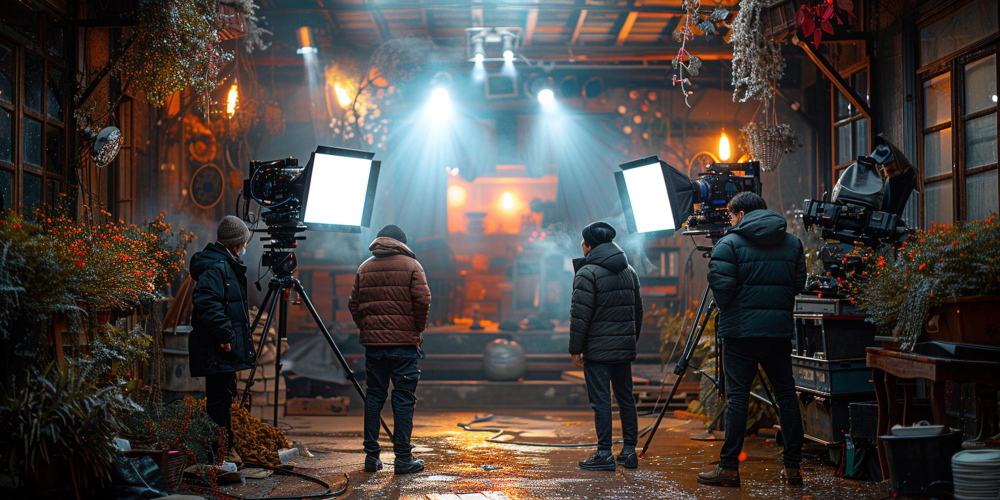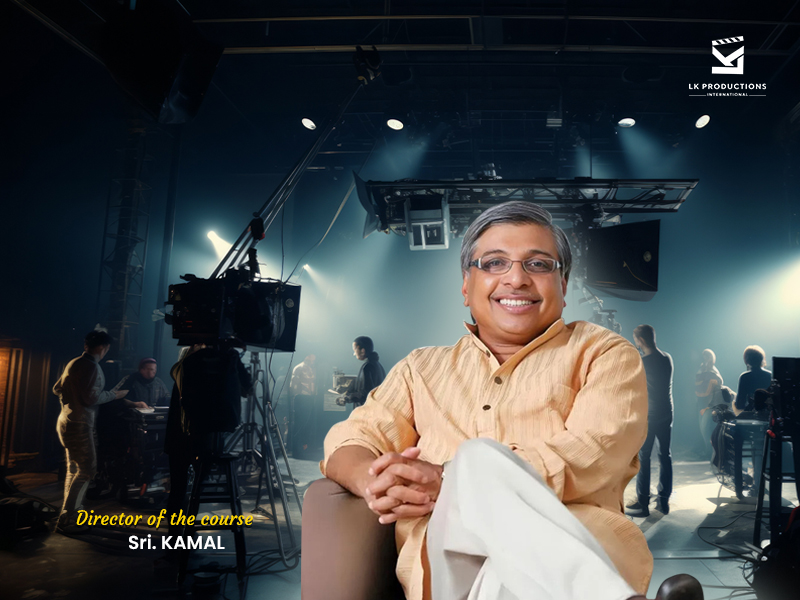We're here to help! Submit your enquiry below.
Introduction to Film Direction Course
If you've ever watched a movie and thought, "I could tell a story like that," then a film
direction course might be your gateway to making that dream a reality. Film direction is more
than just calling "Action!"—it's about weaving together all the elements of filmmaking to
create a compelling narrative that captivates an audience.
Whether you're passionate about storytelling, fascinated by cinematography, or eager to take
charge behind the scenes, a film direction course can equip you with the skills needed to
bring your creative vision to life.
What is in Our Film Direction Course?
Our film direction course is a specialized program designed to teach aspiring directors the
art and science of filmmaking. It covers everything from scriptwriting and cinematography to
editing and post-production. Think of it as a comprehensive guide to turning your ideas into a
polished film.
Whether you're a beginner or have some experience, these courses are tailored to help you
develop the technical and creative skills necessary to thrive in the film industry.

Understanding the Role of a Film Director
The role of a film director is like that of a conductor in an orchestra. The director is responsible for the overall creative vision of the film, guiding the cast and crew to ensure that every scene is executed perfectly. From choosing the right actors to working with cinematographers on camera angles, the director's touch is present in every aspect of the production. It’s a role that requires both leadership and collaboration, creativity and practicality.
Skills Developed in Our Film Direction Course
When you enroll in our film direction course, you're signing up to hone a unique set of skills
that are essential for any director. These include storytelling, visual composition, camera
operation, actor direction, and even an understanding of sound design.
You'll also learn how to manage a production team, solve on-set problems, and bring your
creative vision to life under the pressures of time and budget constraints.
Why Choose a Film Direction Course?
So, why should you choose a film direction course? If you’re passionate about storytelling and want to see your ideas on the big screen, this course is the perfect launchpad. It’s not just about learning the technicalities of filmmaking; it’s about finding your voice as a director and understanding how to communicate your vision effectively. With the film industry constantly evolving, a formal education in film direction can provide you with the tools and network to succeed.

Creative Freedom and Vision
TOne of the biggest draws of a film direction course is the creative freedom it offers. As a
director, you have the power to bring your unique vision to life, guiding every aspect of the
film to ensure it aligns with your creative goals.
This course provides you with the opportunity to experiment with different styles, genres,
and techniques, helping you to discover your own directorial voice.
Industry Demand and Career Opportunities
The film industry is always on the lookout for fresh talent. With the rise of digital platforms and the global demand for diverse content, there are more opportunities than ever for aspiring directors. A film direction course not only equips you with the skills needed to create compelling films but also connects you with industry professionals and potential employers.
Personal and Professional Growth
Beyond the technical skills, a film direction course fosters personal growth. You'll learn how to work under pressure, make quick decisions, and lead a team—skills that are valuable in any profession. Moreover, the course pushes you to think critically and creatively, enhancing your problem-solving abilities and boosting your confidence as a leader.
Core Modules in a Film Direction Course
Every film direction course has its core modules that form the backbone of the curriculum. These modules cover the essential aspects of filmmaking that every director needs to master. From writing a screenplay to the final cut in the editing room, these modules ensure that you gain a well-rounded education in film direction. Let’s dive into some of these key modules.
Scriptwriting and Storyboarding
At the heart of every great film is a strong script and a clear vision of how the story will unfold visually. In this module, you'll learn how to craft compelling narratives and translate them into visual storyboards. You'll explore different storytelling techniques and discover how to structure your screenplay to create tension, emotion, and engagement.
From Concept to Script
The journey from a simple idea to a full-fledged script is both challenging and rewarding. This part of the course guides you through the process of developing your concept into a script, ensuring that your story has a strong foundation. You'll learn about character development, dialogue writing, and how to structure your narrative to keep the audience hooked.
Visual Storytelling Techniques
A film is a visual medium, and as a director, you must understand how to tell a story through images. This module teaches you how to use camera angles, lighting, and composition to convey emotions and narrative without relying on dialogue. It’s all about showing, not telling.
Cinematography Essentials
Cinematography is the art of capturing visual images on film or digital media. This module covers the technical aspects of camera work, from understanding different types of cameras and lenses to mastering camera movements and framing. You’ll also learn about lighting techniques and how they can dramatically change the mood and tone of your film.
Understanding Camera Angles
Camera angles can significantly impact how a story is perceived. In this part of the course, you'll explore the different types of camera angles and shots, such as wide shots, close-ups, and over-the-shoulder shots, and how they contribute to the overall storytelling.
Lighting Techniques and Their Impact
Lighting is a crucial element in filmmaking. It sets the mood, highlights important details, and guides the audience's focus. This module delves into the various lighting techniques used in filmmaking, from natural lighting to dramatic chiaroscuro, and how they affect the visual narrative.
Film Editing and Post-Production
The editing room is where the magic happens. In this module, you’ll learn how to piece together the footage to create a cohesive and engaging story. You’ll explore different editing techniques, learn about pacing, and understand the importance of continuity. Additionally, you'll delve into sound design, mixing, and color grading to enhance the final product.
Editing Techniques for Directors
Editing is more than just cutting and pasting footage; it’s about shaping the film’s narrative. This section of the course teaches you how to use editing to build tension, create emotional impact, and maintain narrative flow. You'll also learn how to work with editors to ensure that your vision is realized in the final cut.
Sound Design and Mixing
Sound is often an overlooked aspect of filmmaking, but it plays a crucial role in setting the tone and atmosphere of your film. This module introduces you to the basics of sound design, from recording and editing dialogue to creating sound effects and mixing tracks for the final production.
Choosing the Right Film Direction Course
Not all film direction courses are created equal, so it’s essential to choose one that aligns with your goals. Factors such as accreditation, curriculum, faculty expertise, and alumni success can significantly influence your decision. Here’s what you should look for when selecting a course.
Accreditation and Reputation
A course’s accreditation and reputation can make a big difference in your career prospects. Accredited courses are recognized by industry bodies, ensuring that the education you receive meets high standards. Additionally, a course with a strong reputation can open doors to networking opportunities and industry connections.
Curriculum and Practical Experience
The curriculum is the backbone of any course. Look for a course that offers a balanced mix of theory and practical experience. Hands-on projects, internships, and opportunities to work on real film sets can provide invaluable experience and prepare you for the challenges of the industry.
Howto Succeed in a Film Direction Course
Success in a film direction course isn’t just about attending classes and completing assignments. It’s about actively engaging with the material, building connections, and constantly improving your craft. Here are some tips to help you make the most of your course.
Active Participation and Networking
Don’t just be a passive learner—engage with your instructors and peers. Participate in discussions, seek feedback on your work, and take advantage of networking opportunities. The connections you make during your course can be invaluable when you enter the industry.
Staying Updated with Industry Trends
The film industry is constantly evolving, with new technologies and trends emerging regularly. Stay informed by reading industry publications, attending workshops, and watching a wide range of films. This will not only keep your knowledge current but also inspire your work.
Practical Tips for Aspiring Directors
As an aspiring director, it’s essential to be proactive. Start by creating your own short films, experimenting with different genres and techniques. Seek out internships or assistant roles on film sets to gain practical experience. And most importantly, never stop learning—every project is an opportunity to improve your craft.
FAQ
Most film direction courses do not have strict prerequisites, but a passion for filmmaking and some basic knowledge of film theory or production can be beneficial.
The course structure typically includes core subjects related to education theory, research methodology, and specialized topics based on your chosen focus area. Each university may have its own specific curriculum. All of our universities are UGC approved.
Yes, many institutions offer online film direction courses that provide flexible learning options while covering the same material as traditional in-person programs.
Graduates can pursue careers as film directors, assistant directors, screenwriters, or producers in the film and television industry. Some may also choose to work on independent films or start their own production companies.
If you’re serious about pursuing a career in filmmaking, a film direction course can provide you with the knowledge, skills, and connections needed to succeed in the industry, making it a worthwhile investment




